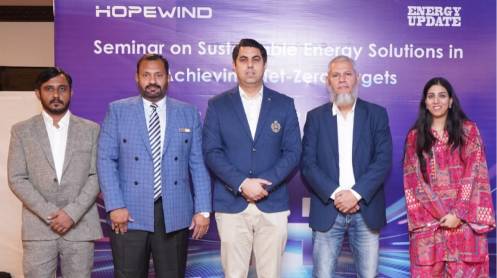LAHORE: Prime Minister’s Pakistan Solarization Committee, Member, Engr. Syed Faizan Ali Shah has outlined major challenges for the solar industry as more and more distributed solar gets inducted into the distributed grid.
“The solar industry must anticipate increase in exports from net-metered systems during shoulder months due to expansion of distributed solar,” he said while addressing a seminar on “Sustainable Energy Solutions – Achieving Net-Zero Targets”, organized by Shenzhen Hopewind Electric in collaboration with Energy Update – a magazine dedicated to energy, in Lahore.
Faizan Ali Shah indicates decrease in minimum operational load of the grid. Some areas are highly concentrated while grids in other areas are comparatively free.
Furthermore, he said that various issues such as reverse power flow, over-voltages, harmonics, low reactive power, power quality issues, power curtailments, higher peak demand year-on-year and tariff increase will crop up.
He informed that the solar PV market has grown over the years due to rising electricity prices and lowering prices of solar PV modules. Besides, the lucrative distributed generation regulation in favor of consumers along with increasing buy-back rates and decreasing pay back periods have contributed to solarization in the country.
On industrial side, the said, there are no red-tapism resulting in no import restrictions on solar panels and inverters, while additionally, the tax breaks and zero custom duties also promoted the solar sector in the country.
Due to conducive environment, he said, the utility scale solar generated 780MW, while distributed solar produced 2700MW excluding K-Electric generation of 600MW. Besides, there is captive solar power generation capacity of 2000 to 3000 MW. “The solar industry has witnessed increased imports of inverter and solar panel equivalent of 13GW this year. It created good business opportunities, promoted self-generation and export to grid,” he added.
The solar industry also has its share of challenges because to imposition of ban on utility scale solar and imports of solar panel in 2018, Besides there were issues of licensing & certification, pricing, net-metering, import of low quality materials and Covid panedemic.
In order to combat the challenges to the solar sector, Faizan Ali Shah underscored the importance of advancement in distribution grid through digitization of the distribution network i.e. transformer monitoring, consumer’s smart monitoring, SCADA systems to monitor & control the flow of power as well as optimizing weather forecasting systems.
The change in regulations with a view to encouraging self-consumption, incentivizing use of batteries, encouraging smart inverters and incentivizing consumers for grid management can help combat the challenges.
The residential batteries can also store excess energy, which can be drained during peak hours to reduce stress on the grid. It will help reduce peak demand and provide stability to the grid. “The batteries are source of energy security and independence,” he said, and also emphasized using smart Inverters.
The solar fraternity can also help mitigate the challenges to the solar sector by encouraging consumers to install solar panels as per regulations, keep inverter voltage settings within the acceptable range, support utility in monitoring the solar PV installed systems, channelize solar procurements and pricing of solar products.
Syed Salman Mohiuddin, Regional Head, Hopewind, Pakistan and UAE, said that Shenzhen Hopewind Electric, established in 2007 by industry experts, has cumulative shipment volume of new energy exceeds 150GW+.
Over the last decade, he said, Hopewind has been continuously making breakthrough in technology and innovation, taking part in the drafting of national, industry or even international standards, contributing to the development of industries. The company covers wind power, PV power, ESS, Hydrogen power, SVG and electrical drives.
He said that the company’s output volume & sales turnover rank among top 05 in domestic market and ranks among Tier-1 solar inverters according to BloombergNEF. “The company has always adhered to innovation and progress. We are the world’s first successful on-grid distributed inverter manufacturer based on cutting-edge technology and deliver on a large scale,” he added.
Marium Khalid from Punjab Energy Efficiency and Conservation Agency (PEECA) urged energy experts to come forward and guide the government to make best use of the sustainable energy solutions.
Aafaaq Ali Khan, Executive Member, Pakistan Solar Association (PSA), forecasts difficult time as so many challenges will be faced by the energy sector in the future. However, he believed that the renewable energy sector will come out of these challenges successfully by dint of its resilience. For instance, he said, when on-grid system will choke, the people will automatically shift to batteries, and the solar system will sustain itself.
Besides, Syed M. Raza Zaidi, Country Manager Technical, Hopewind Pakistan also spoke on the occasion.
Later, mementos were distributed among the government officials and renewable energy experts.
HopeWind Seminar on Sustainable Energy Solutions






